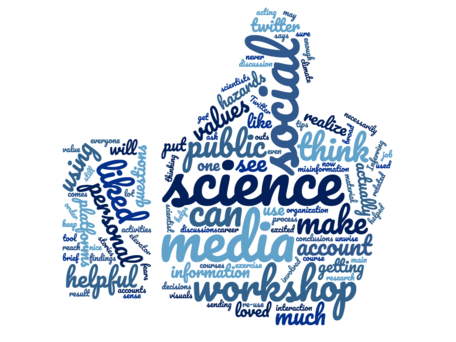Thursday, May 31, 2018
10:00 am PT | 11:00 am MT | 12:00 pm CT | 1:00 pm ET
Presenters: Beth Bartel (UNAVCO) and Wendy Bohon (IRIS)
This webinar is part of a series supporting teaching with InTeGrate principles, using InTeGrate-developed and curated materials as tools.
Registration deadline: Tuesday, May 29

Social media offers earth science educators an opportunity to directly interface with the public, improve public perception of science and scientists, combat scientific misunderstanding and misinformation, and share the joys and challenges of doing science. Many educators are already using social media in innovative ways to engage students, their networks, and the public. In this webinar, we will discuss the power of social media for science, best practices, how you can support your students in effective social media use, and tips for contentious communication that can be applied in all forms of communication.
Goals
At the end of this webinar, participants will have:
- An understanding of the potential impact of the use of social media for science
- Ideas of how to use social media as an educator and with students
- Tools for responding to contentious comments
Logistics
Time – 10:00 am PT | 11:00 am MT | 12:00 pm CT | 1:00 pm ET
Duration – 1 hour
Format – Online web presentation via Zoom meeting software with questions and discussion. Go to the webinar technology page for information on using Zoom. Detailed instructions for joining the webinar will be emailed to registered participants one day prior to the webinar.
Preparation – There is no advance preparation required for this webinar.
Registration deadline: Tuesday, May 29
Please email Mitchell Awalt (mawalt@carleton.edu) if you have any questions about this event.
Presenters
Beth Bartel, Outreach Specialist, UNAVCO
Wendy Bohon, Informal Education Specialist, IRIS
Program
1) Welcome and introductory remarks – Mitchell Awalt, SERC
2) Introduction to the use of social media in science communication
3) Examples of how social media is being used by earth science educators
4) How you can support students in effectively using social media
5) Why social media for science is important: Building trust, promoting diversity, connecting with an audience
6) Responding to contentious communication, in social media and beyond
7) Reflection by participants
Prompt: How do you plan to use social media in your own work or with students?
8) Concluding remarks by presenters
9) Opportunities for further interaction – Mitchell Awalt, SERC
10) Webinar Evaluation
![[creative commons]](https://serc.carleton.edu/images/creativecommons_16.png)